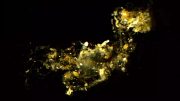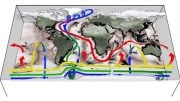
New research indicates that ocean areas rich in marine life are major sources of atmospheric urea, a key nitrogen compound, which can impact marine productivity and climate stability by benefiting nutrient-deficient environments; these findings necessitate a revision of current nitrogen cycle models.
New research indicates that oceanic regions abundant in marine life have a more significant influence on our ecosystems and climate than was earlier believed.
Scientists from the University of Manchester have found that the ocean serves as the primary source of urea, a nitrogen-rich compound essential for the growth and development of living organisms.
The observations reveal an important but unaccounted-for source of reduced nitrogen and offer the first-ever observations of gaseous urea in the air.
The research, published in the journal Proceedings of the National Academy of Sciences, also reveals that urea can be transported over long distances through the atmosphere to benefit other environments that may be nutrient-deficient.
The results could have far-reaching consequences for marine productivity and climate stability.
Emily Matthews, Atmospheric Scientist at The University of Manchester, said: “Our observations provide new insights into the complex interactions between the atmosphere, ocean and ecosystems.
“Understanding the behavior and impact of urea in the atmosphere is vital for advancing our knowledge of how chemicals and substances are transferred through our environment and can help us to inform strategies to address climate change.”
The observations of gas-phase urea in the atmosphere were collected over the North Atlantic Ocean using the FAAM Airborne Laboratory, a UK airborne research facility managed by the National Centre for Atmospheric Science (NCAS) and owned by UK Research and Innovation and the Natural Environmental Research Council.
Measurements made during these flights provide detailed data on the composition and properties of aerosols and gases in the atmosphere. Scientists from The University of Manchester and NCAS have identified unique species important to the marine reduced nitrogen cycle, including the first observations of gas-phase urea in the atmosphere.
The researchers say that the findings have significant implications for our understanding of the nitrogen cycle and call for a revision of current models.
Emily Matthews added: “The ocean plays an important role in maintaining a stable climate through biological activity occurring near the surface of the water and contributes to oceanic uptake of carbon dioxide.
“We now know that it is also a significant source of urea in the atmosphere throughout most of the year, which means we need to modify the processes and factors involved in the nitrogen cycle to account for the newfound importance of urea.”
The nitrogen cycle is the process during which nitrogen moves through both living organisms and physical environments including the atmosphere, soil, water, plants, animals, and bacteria. It is central to the composition of the Earth System and changes of the natural environment through interactions such as aerosol formation, ozone production, and as a supply of essential nutrients to living organisms.
The explanation for the observations of gas-phase urea remains a mystery and further research is needed to fully understand the biogeochemical coupling of nitrogen between the ocean and atmosphere.
The research findings represent an important pathway for the long-range transport of nitrogen to fertilize nitrogen-poor regions of the surface ocean. Revising this knowledge better helps to understand how the ocean biosphere will respond to future changes.
Reference: “Airborne observations over the North Atlantic Ocean reveal the importance of gas-phase urea in the atmosphere” by Emily Matthews, Thomas J. Bannan, M. Anwar H. Khan, Dudley E. Shallcross, Harald Stark, Eleanor C. Browne, Alexander T. Archibald, Archit Mehra, Stéphane J.-B. Bauguitte, Chris Reed, Navaneeth M. Thamban, Huihui Wu, Patrick Barker, James Lee, Lucy J. Carpenter, Mingxi Yang, Thomas G. Bell, Grant Allen, John T. Jayne, Carl J. Percival, Gordon McFiggans, Martin Gallagher and Hugh Coe, 14 June 2023, Proceedings of the National Academy of Sciences.
DOI: 10.1073/pnas.2218127120









“The researchers … call for a revision of current models.”
But, we’ve been told that “the science is settled!” Actually, the science is never settled.
WTF are we paying people to monitor the earth’s climate. It’s been fine for 4 billion years.
Maybe people are monitoring it now because human activity is altering it at an accelerated pace that hasn’t been seen in Earths 4.5billion year history? Just a guess, Frank.
Of course there is Urea in the atmosphere,”you moron scientists thought it was a good idea to use urea in def (diesel exhaust fluid)… that’s a lot of trucks with so called (CLEAN IDLE)
An isotope study of that nitrogen could be very revealing of how long it takes to complete a full nitrogen cycle; I remember having read a paper on a particular nitrogen isotope found in migrating salmon that then found it’s way into the wood of trees that grew on top of mountains hundreds of miles inland; it was proposed that the nitrogen got there by predators feeding on the fish and then defecation at higher altitudes; but now, maybe not, as the winds usually blow west to east in the Canadian southwest, where that study occured; more importantly, the great guano deposits of Chili; did it all get to to the top of the Andes via avian flight or did some of it blown up there by humid sea breezes that condensed at the higher elevations; there’s other places in the world as well; Southwest Africa, if they haven’t changed the name of the nation, dry desert, plants that capture dew drops; possibly also urea? Very intriguing.